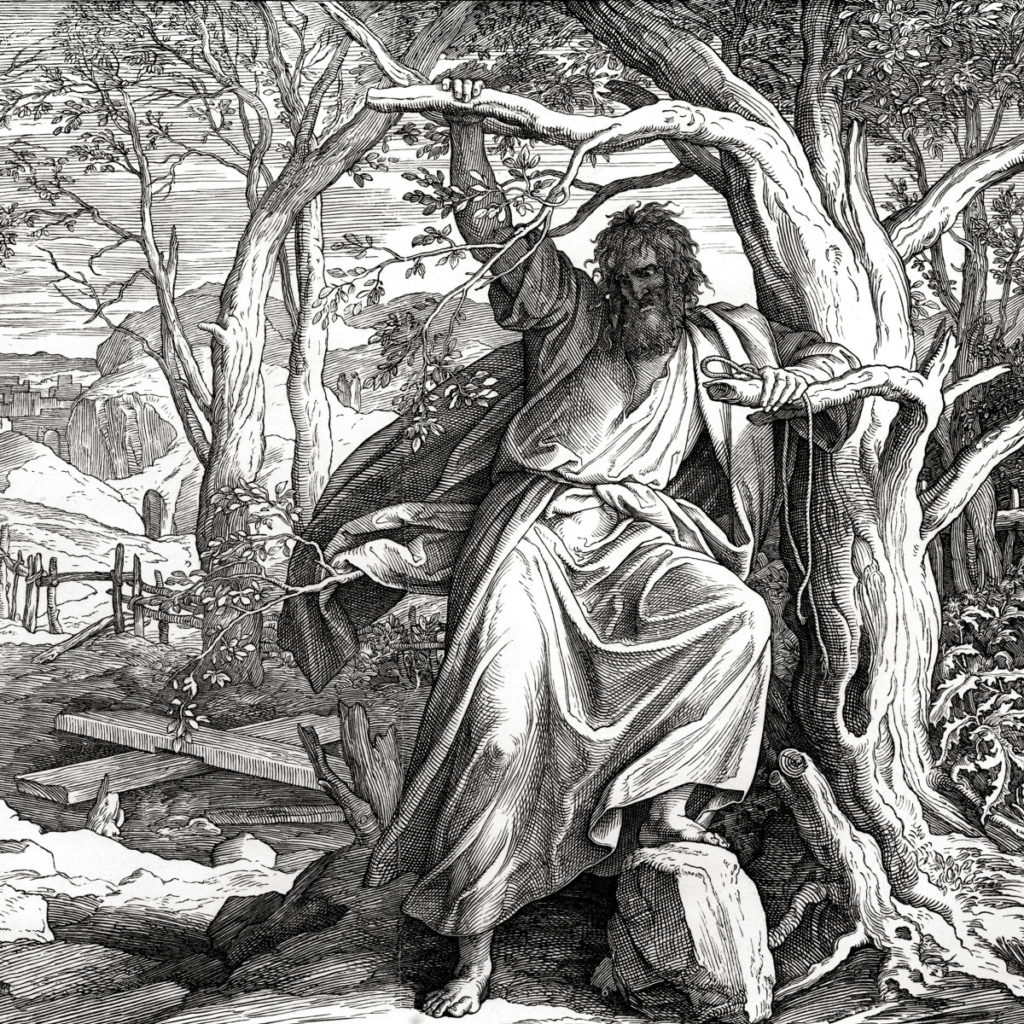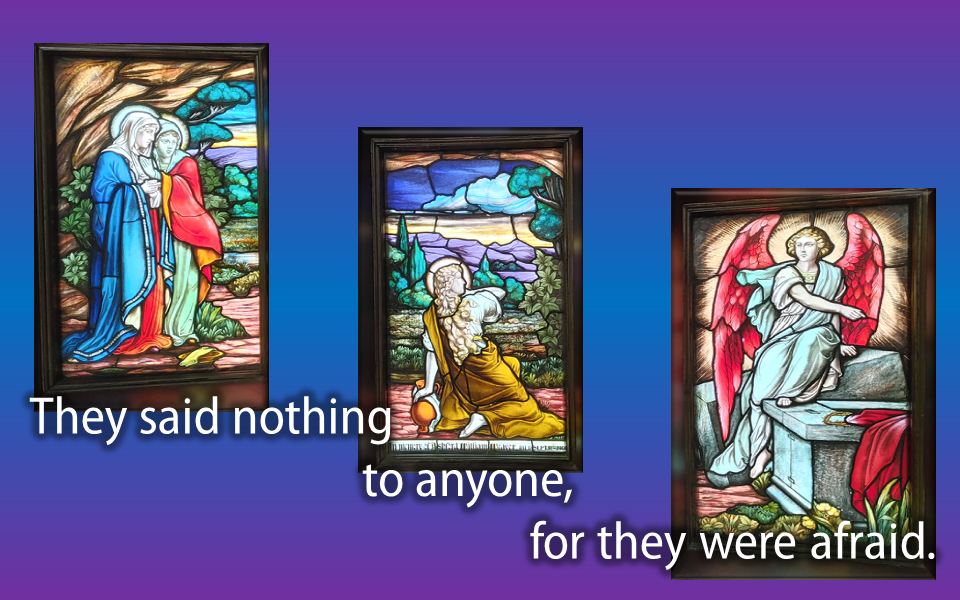Watch sermon video here:
Hespeler, 11 March 2021 © Scott McAndless – Second Sunday after Easter
Acts 1:15-20, 4:32-35, Psalm 133, 1 John 1:1-2:2, John 20:19-31 (click to read)
At the end of a long day’s labour, many of the people passed through the narrow streets of Jerusalem were making their way towards one particular house. Some of them were slaves who worked in the homes of wealthy citizens, a few of them had shops and stalls that they tended, but most really went out every morning with little idea what sort of work they might be doing that day.
They went to the marketplaces with the intention of hiring themselves out to work on some building site or work in someone’s field just outside the walls. They took whatever jobs they could get, and for a full day’s work, they could be paid as much as a denarius.
Of course, many days there was no work to be had. Sometimes some of them also found that people didn’t want to hire them because they came from Galilee and spoke with a strange accent. So there were a fair number who were coming home that evening with nothing in their purse.
Nevertheless, all of them, whether they had worked hard and sweated in the fields or workhouses or whether they had languished in the marketplaces, had faced everything with a light heart and often enough with a song on their lips because of where they were going now and what it meant to them.
As they entered the door, they all took out whatever they had earned or bartered for during the day and joyfully gave it over to the man who stood just inside the door. He offered to each one a blessing that was immediately returned.

As they moved into the open-air courtyard beyond, their noses twitched and their stomachs growled when they saw the piles of bread and the dried fish. There were some olives and dried figs as well as several skins of cheap wine. There was even a hearty stew that had been made with barley, beef and vegetables. They smiled and glanced at each other as some remarked in wonder, “The Lord has provided yet again, just as he promised.” “Praise the Lord,” others responded.
When everyone had finally arrived, one of the leaders stepped forward and he took one of the loaves. “When we were with him in Galilee,” the man began, “we traveled all over the countryside with almost nothing – no staff, no bag, no bread, nor money – not even an extra tunic. And I sometimes worried – we all did – that we would go so hungry that we wouldn’t make it. But Jesus promised us that, if we would only trust our Father in heaven, we would always have enough. And I’m not saying that we always had meals as good as the one you’re going to enjoy tonight, but it is true. There was always enough.
“And every time we stopped at the end of the day, no matter how much food there was, everyone was welcome at the table whether they had brought anything or not. And he always took a loaf of bread and he thanked God for the gift before he broke it and gave it out to everyone. And it was that simple meal that formed us into something special.” And with that, the man broke the bread, some people came forward to distribute it and the feast began.
A Promised Answer to a Persistent Question
When all had eaten their fill, they settled in contentedly to hear a message from one of the leaders. Usually one of those who had been with Jesus from the very beginning would come forward and tell a story of a miraculous healing or repeat one of the stories that Jesus had told while explaining how it applied to what was happening in the world. But they had been promised that, on this night, a special request would finally be answered. The sisters and brothers had heard the story of how Jesus had died many times. It was a horrible and yet beautiful story all at once.
But they always wanted to know how it had come to pass that Jesus had been arrested. They had heard that he had been betrayed and they even knew the name of the betrayer: Judas. But no one seemed to know what had happened to the man after he had acted so treacherously. The story seemed incomplete.
As much as the apostles had been with Jesus almost constantly during his ministry, they had not been able to witness everything about his life and especially about his death. They had neither been able to listen in on whatever trials had been conducted nor on the plots that had been hatched by his enemies. In the same way they had not been able to observe what happened to Judas. But that did not mean that they could not answer the question.
There were two things that allowed them to fill in the gaps in the story of Jesus. First of all, they knew that the scriptures had laid out just about everything that was supposed to happen to the Messiah. So, when they found anything in what would some day come to be called the Old Testament that seem to fit the details of Jesus’ life, they knew they could be certain that that was how it had happened.
This was how they were sure, for one thing, that it had been Judas who had betrayed Jesus. For was there not a story in the Book of Genesis of how Judas (or Judah in Hebrew), one of the sons of Jacob, had come up with a plot to sell his brother Joseph to some foreigners for a sum of money? Surely that was a prophecy about Jesus and it had been fulfilled when Jesus was betrayed.
The other source that the apostles could rely on was the Holy Spirit who would guide and inspire them. When they opened their hearts, they could be sure that the Spirit would lead them towards the truth of all things.
So, the apostles had studied the scriptures and they had opened their hearts to the Holy Spirit, and tonight they would tell the people what had been revealed to them concerning this Judas.
Joseph from Cyprus
But first, the apostle announced, there was going to be a very special presentation. He went and took a seat as another man in the gathered group rose and came forward. It was Joseph. A member of the tribe of Levi and a native of Cyprus, he had been a part of the growing community that gathered in this house for a few months. In that time the gregarious and generous man had come to be well known and loved by all, so they all greeted him warmly and then quietly waited to hear what he might have to say.
“My dear sisters and brothers,” he began, “I know that you are amazed, as am I, by how the God who raised our Lord Jesus from the dead also provides for us our daily bread when we gather. These are the miracles by which God creates our community and it is marvelous in our sight. You know very well that the money you share from your daily labours is not sufficient to cover all that is provided, as well as the other things that are necessary to our common life.
The other day, as I was thanking God for this miraculous provision and marveling at how it was possible, the Lord spoke to me. He gave me the conviction that I was to be a part of that miracle. He set me to thinking about a piece of property, a field that I had inherited from my father. The Holy Spirit has revealed to me that that field no longer belongs to me, but it belongs to Jesus who has claimed all of me. It is part of God’s provision for this community. And so I have sold that field and I brought the money that I gained and have laid it here, at the feet of the Apostles. It is what has provided your feast this evening and it will for many evenings yet to come.
The whole group cheered this surprising and heartwarming announcement as Joseph returned to his seat and an apostle stepped forward. “We rejoice in our brother Joseph today. You all know what an incredible blessing he has been to our community and this is made all the more certain today. In fact, we have decided he deserves a new name. We think that he should be called the son of encouragement.
The whole group clearly agreed with this idea and they took up the new name as a chant in their native Aramaic tongue: “Bar Nabas, Bar Nabas!” and indeed, the name of Barnabas did stick to Joseph from that day forward.
The Betrayer
Finally, the time had come. The apostle sat in front of the gathered company and hugged his knees as he began to tell the story. “Who can say why someone would choose to betray our Lord, to hand him over to those who sought his death? We only know that, in this city both Herod and Pontius Pilate, with the Gentiles and the peoples of Israel, gathered together against God’s holy servant Jesus to do whatever God’s hand and plan had predestined to take place.[1] And was Judas’ role also so predestined? Perhaps, but surely Satan must have entered into him to make such a thing possible.
“But this is what happened to him after he carried out his unspeakable betrayal. He was paid and paid handsomely. And he looked about to try and decide what he should do with his ill-gotten gains. He went out and he found a field. You know that field just outside the city to the south, the one where the soil is red? Well Judas went and he bought that field. And then he thought he was content and secure – that his field would provide him with all that he needed for the rest of his life.
“But know this: God is not mocked. The very day when he took possession of his field, he walked into it. And as he walked, he tripped on a root and he fell headlong. And such was the wickedness and greed inside of him, that his middle began to swell up until finally it burst and blew up and his entrails flew all over the field that he had bought – a field of blood. And that is how that piece of land shall be known from now on.
The company stirred as they heard this harrowing tale. It was very disturbing, but it also seemed so fitting for one who had carried out such a crime in order to enrich himself.
The Difference the Resurrection Makes
The apostle continued, “Tonight you have heard the story of two men, one who bought a field, and one who sold one. And in the difference between these two men, between Judas and Joseph, you will find the answer to the question that many of you have been asking me: what difference does it make if Jesus really rose from the dead?
Judas died without knowledge or belief in the resurrection of our Lord. And without that knowledge, he could have no hope or security beyond this present world system. For this reason, he knew he had to have property and that he had to have it at any cost, even at the cost of the life of his friend and Lord. He thought that that could make him safe, but God thought differently and we all see the folly of the choice that he made.
But Joseph lives with the knowledge and reality of the resurrection of Jesus. For this reason, he knows that nothing has more value than the community of the resurrected one, nor can anything else give him any security in this world or any world. And so, for Joseph, the field that he had was of little worth in comparison and he has chosen to act accordingly. This is the difference that the resurrection makes for us all.
Respecting the Biblical Authors
The fact that there are two accounts of the death of Judas in the Bible, one in the Gospel of Matthew and one in the Book of Acts, has created a bit of a problem down to the centuries because the two accounts contradict each other. According to the Gospel of Matthew, Judas committed suicide. According to Acts, he kind of spontaneously exploded.

Both accounts associate his death with the purchase of a field called the field of blood, but according to Matthew, the priests in the temple bought the field and according to Acts, Judas bought it for himself.
Now, some people will say that the two stories are not really in contradiction with each other and that if you push and shove at these two passages you can force them to agree. And perhaps you can, but if you do, you end up twisting what the original authors actually wrote, and missing much of what they were trying to say. And I have too much respect for the Bible to twist it to suit my needs.
As a result of these attempts to reconcile two different accounts, what has often happened is that people have tried to downplay the fact that, according to Acts, Judas bought the field because that contradicts what it says in Matthew. And that has made us miss a key part of the story of the Book of Acts – because I don’t think that it is just by chance that, in the first chapter of Acts, somebody buys a field and then, three chapters later, somebody sells one. That simple contrast, is meant to illustrate so much to us of what it meant to the church of that age to know and believe that Jesus had really risen from the dead. And I wonder, how much difference does that knowledge make for us today?
[1] Act 4:27-28


